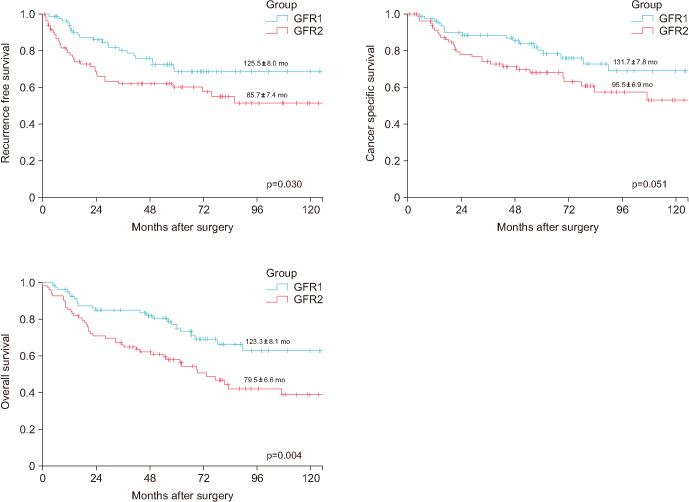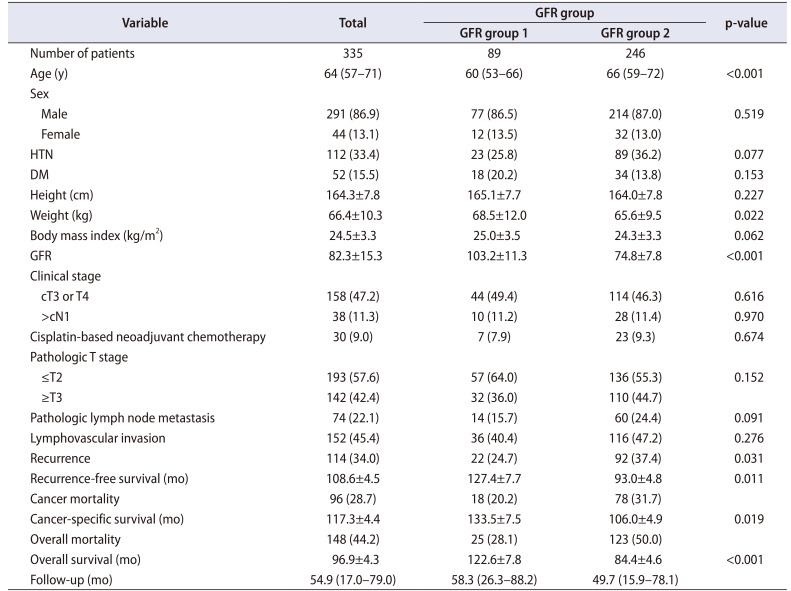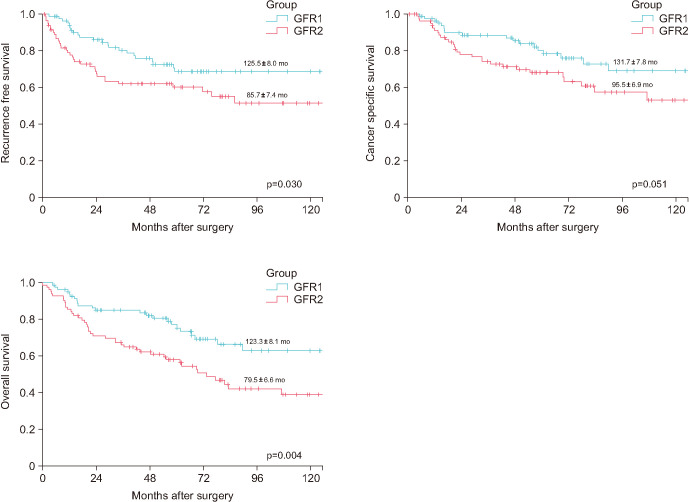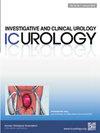肾功能下降对根治性膀胱切除术后不良肿瘤预后的影响。
IF 2.5
3区 医学
Q2 UROLOGY & NEPHROLOGY
引用次数: 0
摘要
目的:评价术前肾功能损害对行根治性膀胱切除术的尿路上皮癌患者肿瘤预后的影响。材料与方法:回顾性分析2004年至2017年行根治性膀胱切除术的尿路上皮癌患者的病历。所有患者术前均行99mtc -二乙烯三胺五乙酸肾显像(DTPA)检查。根据肾小球滤过率(GFR)将患者分为两组:GFR 1组,GFR≥90 mL/min/1.73 m²;结果:GFR 1组平均复发时间为125.5±8.0个月,GFR 2组为85.7±7.4个月(p=0.030)。GFR 1组患者的平均肿瘤特异性生存期为131.7±7.8个月,GFR 2组患者的平均肿瘤特异性生存期为95.5±6.9个月(p=0.051)。GFR 1组患者平均总生存期为123.3±8.1个月,GFR 2组患者平均总生存期为79.5±6.6个月(p=0.004)。结论:术前GFR值在60≤GFR范围本文章由计算机程序翻译,如有差异,请以英文原文为准。



Effect of decreased renal function on poor oncological outcome after radical cystectomy.
Purpose To evaluate the impact of preoperative renal impairment on the oncological outcomes of patients with urothelial carcinoma who underwent radical cystectomy. Materials and Methods We retrospectively reviewed the medical records of patients with urothelial carcinoma who underwent radical cystectomy from 2004 to 2017. All patients who underwent preoperative 99mTc-diethylenetriaminepentaacetic acid renal scintigraphy (DTPA) were identified. We divided the patients into two groups according to their glomerular filtration rates (GFRs): GFR group 1, GFR≥90 mL/min/1.73 m2; GFR group 2, 60≤GFR<90 mL/min/1.73 m2. We included 89 patients in GFR group 1 and 246 patients in GFR group 2 and compared the clinicopathological characteristics and oncological outcomes between the two groups. Results The mean time required for recurrence was 125.5±8.0 months in GFR group 1 and 85.7±7.4 months in GFR group 2 (p=0.030). The mean cancer-specific survival was 131.7±7.8 months in GFR group 1 and 95.5±6.9 months in GFR group 2 (p=0.051). The mean overall survival was 123.3±8.1 months in GFR group 1 and 79.5±6.6 months in GFR group 2 (p=0.004). Conclusions Preoperative GFR values in the range of 60≤GFR<90 mL/min/1.73 m2 are independent prognostic factors for poor recurrence-free survival, cancer-specific survival, and overall survival in patients after radical cystectomy compared with GFR values of ≥90 mL/min/1.73 m2.
求助全文
通过发布文献求助,成功后即可免费获取论文全文。
去求助
来源期刊

Investigative and Clinical Urology
Medicine-Urology
CiteScore
4.10
自引率
4.30%
发文量
82
审稿时长
4 weeks
期刊介绍:
Investigative and Clinical Urology (Investig Clin Urol, ICUrology) is an international, peer-reviewed, platinum open access journal published bimonthly. ICUrology aims to provide outstanding scientific and clinical research articles, that will advance knowledge and understanding of urological diseases and current therapeutic treatments. ICUrology publishes Original Articles, Rapid Communications, Review Articles, Special Articles, Innovations in Urology, Editorials, and Letters to the Editor, with a focus on the following areas of expertise:
• Precision Medicine in Urology
• Urological Oncology
• Robotics/Laparoscopy
• Endourology/Urolithiasis
• Lower Urinary Tract Dysfunction
• Female Urology
• Sexual Dysfunction/Infertility
• Infection/Inflammation
• Reconstruction/Transplantation
• Geriatric Urology
• Pediatric Urology
• Basic/Translational Research
One of the notable features of ICUrology is the application of multimedia platforms facilitating easy-to-access online video clips of newly developed surgical techniques from the journal''s website, by a QR (quick response) code located in the article, or via YouTube. ICUrology provides current and highly relevant knowledge to a broad audience at the cutting edge of urological research and clinical practice.
 求助内容:
求助内容: 应助结果提醒方式:
应助结果提醒方式:


